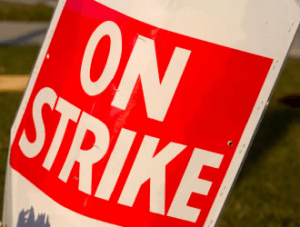Organised Labour declares nationwide demonstration
 Organised Labour would embark on a nationwide demonstration on Wednesday January 20, 2016, starting from 0800 hours from the Obra Spot in Accra.
Organised Labour would embark on a nationwide demonstration on Wednesday January 20, 2016, starting from 0800 hours from the Obra Spot in Accra.
The demonstration would run concurrently throughout all the regional capitals.
This is in protest against the recent increases in utility tariffs and the energy sector levies among other things.
There is a limit to what Ghanaians can bear and you do not tax people to their death, Mr Kofi Asamoah, General Secretary of the Trades Union Congress (TUC), said at a press conference in Accra on Friday.
He said the regional representatives would soon inform workers of the routes for the demonstrations in the various regions and therefore called on all workers, both in the formal and informal sectors to join the national crusade to express their outrage over the insensitive increases in taxes, levies and utility prices at the time of the year when workers and the average Ghanaian were at their most difficult economic ebb.
Mr Asamoah threw more light on the facts on the issue which began in December 2015, when the Public Utilities Regulatory Commission (PURC) and government announced deep increases in utility tariffs of 59.2 per cent for electricity and 67.2 per cent for water.
He said this was at a time Ghanaians were preparing for Christmas with all the difficulties that have come to be associated with the period, “then right after the Yuletide, they are welcomed with new packages of astronomical increases in fuel prices ostensibly emanating from an energy sector levies Act, which was rushed through Parliament under a certificate of urgency at a time they were all set for the festive break”.
He said for water, some consumers with low incomes who used to be on lifeline consumption are now being made to pay for increases exceeding 160 per cent, but “sadly, our government decided to hide these increases from us, sneak it through parliament with no genuine debate”.
According to him, Organised Labour along with other civil society groups and the generality of Ghanaians had complained and appealed to government to do something about the situation, and officially written to government and had series of meetings in an attempt to have an amicable settlement.
“Our last meeting with government ended inconclusively at the Flagstaff House yesterday,” and the demonstration, he said, are intended principally to get government to reduce the utility tariffs and to withdraw the ‘Killer’ Energy Sector Levies Act, he said.
“Our actions are informed by the simple fact that in our view, government has lost touch with the economic and social realities of Ghana and of Ghanaians. And that’s what happens to every government and country that allows its economic and social policies to the dictate of the International Monetary Fund,” he added.
Mr Asamoah, however, said this year government raised public sector wages by 10 per cent, and with inflation at near 17 per cent, there was an expected seven per cent decline in public sector earnings.
He said for workers in the private sector, the prolonged energy crises has meant that most of them have either lost their jobs or are on the verge of doing so, and in such situations wage increases are difficult to obtain.
He said there is currently no relief for the formal sector worker who already pays majority of the direct taxes used to run the country and suffers from such punitive indirect taxes without commensurate increases in incomes or the basic public services that make this sacrifice worthwhile.
Source: GNA
